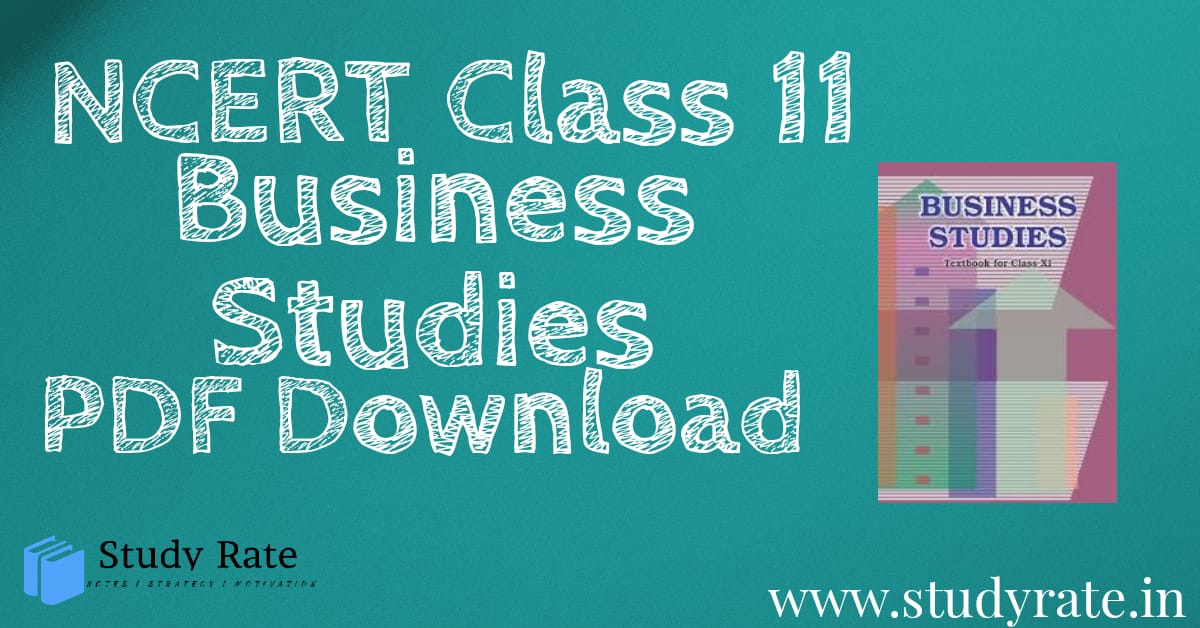The National Council of Educational Research and Training (NCERT) is an autonomous body entrusted with the responsibility of publishing textbooks such as the NCERT book for Class 11 Business Studies. For the CBSE examination, students can adhere to the NCERT book of Business Studies Class 11 as it elucidates on all topics and concepts included in the CBSE syllabus. All necessary topics are also systematically covered in this book.
NCERT Books Class 11 Business Studies: The National Council of Educational Research and Training (NCERT) publishes Business Studies textbooks for Class 11. The NCERT Class 11th Business Studies textbooks are well known for it’s updated and thoroughly revised syllabus. The NCERT Business Studies Books are based on the latest exam pattern and CBSE syllabus.
NCERT keeps on updating the Business Studies books with the help of the latest question papers of each year. The Class 11 Business Studies books of NCERT are very well known for its presentation. The use of NCERT Books Class 11 Business Studies is not only suitable for studying the regular syllabus of various boards but it can also be useful for the candidates appearing for various competitive exams, Engineering Entrance Exams, and Olympiads.
NCERT Books Class 11 Business Studies PDF Download
| Class | 11th |
| Board | CBSE |
| Book | NCERT |
| Subject | Business Studies |
| Medium | English / Hindi |
| Study Materials | Free Study Materials Available |
| NCERT Maths | NCERT Business Studies Book Class 11 PDF Download |
NCERT Class 11 Business Studies Books in English
- Chapter 1 Nature and Purpose of Business
- Chapter 2 Forms of Business Organisation
- Chapter 3 Private, Public and Global Enterprises
- Chapter 4 Business Services
- Chapter 5 Emerging Modes of Business
- Chapter 6 Social Responsibilities of Business and Business Ethics
- Chapter 7 Formation of a Company
- Chapter 8 Sources of Business Finance
- Chapter 9 Small Business
- Chapter 10 Internal Trade
- Chapter 11 International Business-I
- Chapter 12 International Business-II
Class 11 Business Studies NCERT Book PDF Download
NCERT Books for Class 11 Business Studies – Hindi Medium
- Chapter 1: व्यवसाय, व्यापार और वाणिज्य
- Chapter 2: व्यावसायिक संगठन के स्वरुप
- Chapter 3: निजी, सार्वजानिक एवं भूमंडलीय उपक्रम
- Chapter 4: व्यावसायिक सेवाएँ
- Chapter 5: व्यवसाय की उभरती पद्यतियाँ
- Chapter 6: व्यवसाय का सामाजिक उत्तरदायित्व एवं व्यावसायिक नैतिकता
- Chapter 7: कंपनी निर्माण
- Chapter 8: व्यावसायिक वित्त के स्रोत
- Chapter 9: लघु व्यवसाय एवं उघमिता
- Chapter 10: आंतरिक व्यापार
- Chapter 11: अंतर्राष्ट्रीय व्यापार
Class 11 Business Studies NCERT Book in Hindi PDF Download
Why NCERT Class 11 Business Studies Book is Important
The importance of NCERT Books for Class 11 Business Studies are listed below:
- NCERT Books for Class 11 Business Studies covers all the important topics and concepts that are prescribed in NCERT Curriculum and CBSE Class 11 Business Studies Syllabus.
- All the topics and concepts are explained in easily understandable language.
- Helps to build strong foundation on all the concepts.
- If students are clear with questions and answers present in NCERT books then they can easily score good marks in the examination.
- Students can easily prepare for their board exams.
- Most of the questions asked in the board examination are completely from the NCERT Solutions.
- Helps to understand the basic concepts clearly.
- Helps in preparation of scholarship exams like NTSE, Olympiad as most of the scholarship exams syllabus is same as NCERT Syllabus.
- Students who are aiming to secure prestigious Government Jobs such as UPSC, FCI must have good knowledge of NCERT Books.
We hope that this detailed article on NCERT Books Class 11 Business Studies helps you in your preparation and you crack the Class 11 exams or competitive exams with excellent scores.
Chapter-wise Analysis of the NCERT Book of Class 11 Business Studies
Chapter 1: Business, Trade and Commerce
History of Trade and Commerce is the initial part of Chapter 1. Detailed explanation about the indigenous banking system of early times is followed by a note on ‘Rise of Intermediaries’.
Chapter 1 of Business Studies Class 11 book NCERT also briefs students about the following topics adhering to the history of trade in India-
- Transport
- Merchant Corporations
- Major Trade Centres (Pataliputra, Peshawar, Taxila, Indraprastha, Mathura, Varanasi, Mithila, Ujjain, Surat, Madura, Broach, Kaveripatta, and Tamralipti)
This chapter proceeds to talk about the position of India sub-continent (since 1 AD to 1991) in the world economy. Other contents included in the 1st chapter of NCERT Business Studies book Class 11 are-
- Concept of Business
- Characteristics of Business
- Comparison of Business, Profession and Employment
- Classification of Business Activities
- Industries
- Trade and Commerce
Business risks and objectives of a business are discussed towards the end of this chapter.
Chapter 2: Forms of Business Organisation
Various forms of business organisations include sole proprietorship, joint Hindu family business, partnership, cooperative societies, and Joint-stock companies. Chapter 2 of Business Studies Class 11 NCERT textbook explains the different features of all these business forms. This chapter also includes a detailed analysis of the merits and demerits of each business form.
A company can be of two types. It can either be private or public. In this chapter, students learn about how each of the functions. The factors which influence the choice of business organisation form are also elaborated. They are-
- Cost and ease of setting up an Organisation
- Liability
- Continuity
- Management ability
- Capital considerations
- Degree of control
- Nature of business
A list of important terms related to the chapter comes at the end of the chapter.
Chapter 3: Private, Public, and Global Enterprises
Introduction to private and public sector an economy appears in the 3rd chapter of NCERT books for class 11 Business Studies. It explains the features, merits, and demerits of both the sectors. The lesson briefs about Statutory Corporations or public enterprises. These are enterprises which have been established through a Special Act of the Parliament.
Chapter 3 explains the changing role of public sector in an economy. Global enterprises and its features are also discussed. Another important topic in Chapter 3 is Joint ventures. There are two different types of a joint venture. They are-
- Contractual Joint Venture (CJV)
- Equity-based Joint Venture (EJV)
Examples, features, and benefits of a Joint venture are included here. Towards the end, the chapter has a note on Public-Private Partnership (PPP)
Chapter 4: Business Services
Class 11 BST NCERT book in its 4th chapter discusses the nature of business services. This is also known as the 5 Is of services. They include-
- Intangibility
- Inconsistency
- Inseparability
- Inventory
- Involvement
Different types of services are Business service, social service, and personal service. Here in this chapter, all these services are explained. Chapter 4 also carries the difference between goods and services.
This chapter provides a detailed study of different types of bank, including-
- Commercial banks
- Cooperative banks
- Specialised banks
- Central bank
E-banking is a crucial topic in Chapter 4 of NCERT Business Studies book class 11. In the context of Insurance, the following have been discussed-
- Types
- Principles
- Functions
The chapter concludes with a note on communication services, including postal and telecom services.
Chapter 5: Emerging Modes of Business
Chapter 5 in Business Studies book Class 11 NCERT teaches about the latest modes of business activities. It can be termed as e-business. This chapter provides a detailed discussion of the scope of e-business in today’s world. Benefits of e-commerce have been listed down, both in terms of the business organisation as well the society.
On the contrary, limitations of e-business are also mentioned. There is a chart in this chapter which points the difference between traditional business and e-business. Chapter 5 also mentions the resources which are required for the successful implementation of e-business.
Outsourcing is another topic in this chapter of BST NCERT book Class 11. The various needs and concerns relevant to outsourcing have been detailed.
Chapter 6: Social Responsibilities of Business and Business Ethics
The concept of social responsibility with reference to business is what Chapter 6 is about. The lesson explains the need for corporate social responsibility. A detailed guide of arguments for and against social responsibility has been incorporated in Chapter 6. Arguments in favour of social responsibility include the following points-
- Justification for existence and growth
- Long-term interest of the firm
- Avoidance of government regulation
- Maintenance of society
- Availability of resources with business
- Converting problems into opportunities
- A better environment for doing business
- Holding business responsible for social problems
Arguments against social responsibility include-
- Violation of profit maximisation objective
- Burden of consumers
- Lack of social skills
- Lack of broad public support
Chapter 6 of NCERT Business studies book Class 11 also briefs about the reality of social responsibility and its kinds. Discussion on environmental pollution and the role of business to protect the environment is also included.
Chapter 7: Formation of a Company
Chapter 7 elaborates the ins and outs of forming a new company. One of the important aspects in the formation of a new company is its promotion. The lesson teaches about the various functions of a promoter.
The different documents which are required to be submitted to form a company have been mentioned and discussed in Chapter 7. This chapter of BST Class 11 NCERT book explains the other formalities of company formation. These formalities include-
- Incorporation
- Capital Subscription
Difference between Memorandum of Association and Articles of Association in terms of objectives, position, relationship, validity and necessity is included in Chapter 7.
Chapter 8: Sources of Business Finance
The 8th chapter in NCERT book of BST Class 11 is about the meaning, nature, and significance of business finance. Multiple financial needs of a business have been categorised in Chapter 8. It includes-
- Fixed capital requirements
- Working capital requirements
This is followed by a classification of the sources of funds in the form of a chart. Sources of funds can be classified based on the period, ownership, source of generation, etc. Different sources of finance are explained, along with their merits and limitations. The sources mentioned are-
- Retained earnings
- Trade credit
- Factoring
- Lease financing
- Public deposits
- Commercial paper
- Issue of shares
- Debentures
- Commercial banks
- Financial institutions
International financial is discussed towards the end of this lesson.
Chapter 9: Small Business
Chapter 9 of CBSE class 11 Business Studies NCERT book informs about the different types of small-scale business. Manufacturing and services are explained in details. The main three types of manufacturing and services are-
- Micro-Enterprise
- Small Enterprise
- Medium enterprise
The chapter has notes on village and cotton industries as well. It elaborates the role of small business in India, specifically rural India.
Chapter 9 also Talks About The Government’s Assistance in Backing Small Business units. Some of These Measures Include-
- National Bank for Agriculture and Rural Development (NABARD)
- Rural Small Business Development Centre (RSBDC)
- National Small Industries Corporation (NSIC)
- Rural and Women Entrepreneurship Development (RWED)
- Scheme of Fund for Regeneration of Traditional Industries (SFURTI)
- District Industries Centers (DICs)
The 9th chapter of NCERT Business Studies Book Class 11 explains Intellectual Property Rights (IPR) and its importance.
Chapter 10: Internal Trade
In this chapter, students learn about wholesale trading. Here are some of the services provided by wholesale manufacturers-
- Facilitating Large scale production
- Bearing risk
- Financial assistance
- Expert advice
- Help in a marketing function
- Facilitate production continuity
- Storage
The services offered by manufacturers to retailers include-
- Availability of goods
- Marketing support
- Grant of credit
- Specialised knowledge
- Risk sharing
Next, in this chapter of NCERT Business Studies book class 11, retail trading has been discussed. Services of retailers consist of the following-
- Help in the distribution of goods
- Personal selling
- Enabling large-scale operations
- Collecting market information
- Help in promotion
Chapter 10 also explains the mechanism of Goods and Services Tax (GST).
Chapter 11: International Business
This chapter clearly explains the meaning of international business. It gives a detailed study of the reasons behind international business. Chapter 11 also describes how international business differs from domestic business.
Modes of entry into an international business are also discussed in this lesson. These include the following-
- Exporting and importing
- Contract manufacturing
- Licensing and franchising
- Joint Ventures
- Wholly owned subsidiaries
Chapter 11 of NCERT Business Studies book Class 11 gives detailed information regarding the International Bank for Reconstruction and Development, popularly known as the World Bank. Other vital topics in this chapter are the International Monetary Fund (IMF) and the World Trade Organisation (WTO).





